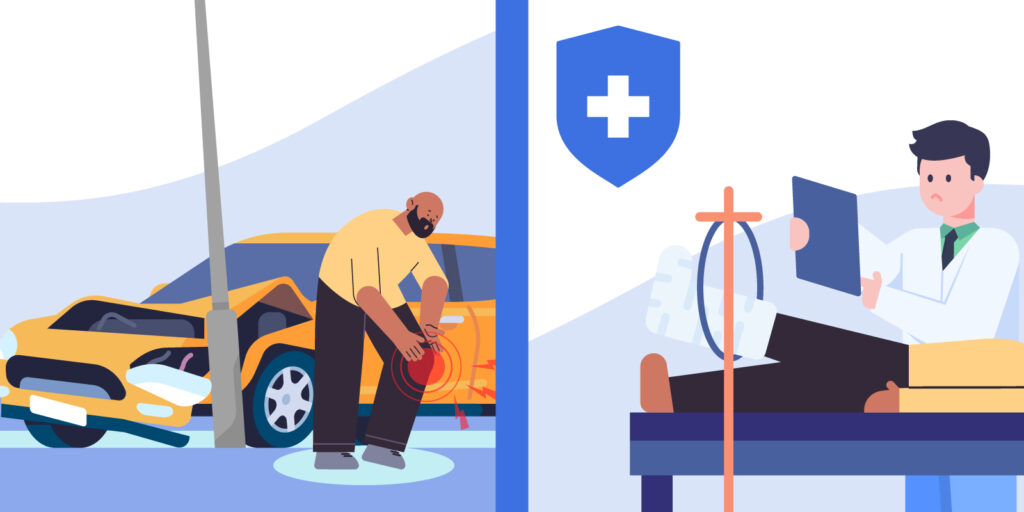New Hampshire is the only state that doesn’t require its drivers to carry auto insurance. If you live in any other state, you’ll need an insurance policy with some combination of bodily injury liability and property damage liability. Some states even require drivers to purchase medical payments coverage, uninsured motorist coverage and/or underinsured motorist coverage.
Unfortunately, no matter how much auto insurance you carry, sometimes it’s not enough to cover all the expenses arising from an accident. Personal injury protection, or PIP insurance, can help pay for medical bills and other expenses that aren’t covered by your health insurance. This guide explains what PIP auto insurance covers and why this type of coverage is important.
What Is PIP Insurance?
PIP coverage, also known as no-fault insurance, covers medical expenses and other costs arising from an auto accident. What makes this type of insurance different from standard auto insurance is that it covers eligible expenses regardless of who’s responsible for the crash. PIP typically covers medical expenses that aren’t covered by your health insurance plan, as well as lost wages associated with the accident. If you have PIP insurance, you may even be covered if you’re injured as a passenger in someone else’s car.
PIP Coverage: What’s Included
PIP is known as no-fault coverage because it kicks in regardless of who caused the accident. That means you can cause an accident and still use your PIP insurance to cover accident-related medical expenses and other covered costs.
Here are just a few examples of what PIP typically covers:
Medical Care
If your health plan doesn’t cover certain medical expenses, you may be able to pay for them with your PIP coverage. Examples of covered expenses include surgery, emergency care, dental care, medical supplies, medications and nursing services. Remember that the expense must be related to your auto accident to be covered by PIP. For example, you can’t use PIP to have a cavity filled, but you may be able to use it to get a partial denture to replace a tooth knocked out in an auto accident.
Personal Services
After an accident-related injury, you may have limited mobility while you heal, making it difficult to perform your regular activities. You may be able to use PIP coverage to pay for someone to clean your house, prepare meals or perform other personal services during your recovery.
Lost Wages
It may take several months to recover enough to return to your normal duties at work. For example, a broken femur usually takes about 5 months to heal completely. Depending on the extent of your injuries, you may be put on light duty or unable to work at all while you recover. In some cases, PIP insurance covers your lost wages during this period.
Funeral Expenses
Unfortunately, approximately 1.3 million people die in auto accidents each year. If your accident results in a fatality, your PIP insurance may cover funeral expenses. It won’t ease your pain, but it can help you limit your out-of-pocket costs.
What’s Not Covered
Although PIP offers a great deal of protection, it doesn’t cover everything. Here are just a few examples of items that aren’t covered by this type of insurance:
- Expenses that aren’t related to your auto accident
- Vehicle theft
- Vehicle damage (with the exception of Delaware)
- Damage to property owned by other people
- Expenses that are above your coverage limits
How Much PIP Insurance Do You Need?

How much PIP you need really depends on the terms of your health plan. If you have an excellent health plan with low cost-sharing requirements, then it makes sense to buy the lowest amount of PIP coverage available. People with high-deductible health plans or with plans that don’t provide comprehensive coverage should purchase as much PIP insurance as they can afford.
Here are a few scenarios to help you decide how much PIP insurance you need.
Scenario 1
You have a health insurance plan with a $500 deductible and a 90/10 coinsurance split. This means you’d only have to pay 10% of the cost of each covered service. The plan also has a $5,000 out-of-pocket maximum, meaning the most you’d have to pay for medical expenses in a single year is $5,000. In that case, you don’t need a huge amount of PIP to pay for the expenses your insurance doesn’t cover.
Scenario 2
You purchased a Bronze plan from the Health Insurance Marketplace. Bronze plans typically have 60/40 coinsurance, meaning you’d have to pay 40% of the cost of each covered medical service. Because Bronze plans cost the least, they also have high out-of-pocket maximums. In 2023, insurance companies are allowed to set out-of-pocket maximums as high as $9,100 for individuals and $18,200 for families. In this scenario, it makes sense to purchase more PIP coverage since your health plan will cover a smaller portion of your accident-related medical expenses.
Scenario 3
You belong to a cost-sharing group instead of carrying traditional health coverage. Cost-sharing plans allow members to pool their money and pay each other’s medical bills. Although cost sharing is helpful, it’s not equivalent to standard health insurance, which means your accident-related expenses may not be covered or may be covered at a lower percentage than they would be with a traditional health plan. In this case, you’d benefit from buying as much PIP as you could afford.
Are You Required to Have PIP Insurance?
Some states require drivers to purchase PIP coverage. Other states have PIP available, but they don’t require residents to purchase it. You’re required to have PIP if you live in one of the following states:
- Delaware
- Florida
- Hawaii
- Kansas
- Kentucky
- Maryland
- Massachusetts
- Michigan
- Minnesota
- New Jersey
- New York
- North Dakota
- Oregon
- Pennsylvania
- Puerto Rico
- Utah
PIP is optional in these states:
- Arkansas
- District of Columbia
- New Hampshire
- South Dakota
- Texas
- Virginia
- Washington
Should You Buy PIP Coverage?
Even if you’re not required to buy PIP, it makes sense to purchase at least a small amount to ensure you’re covered in the event of an auto accident. This type of coverage gives you the peace of mind of knowing that you have a plan in place for covering accident-related expenses that your health insurance plan won’t pay.
You might also be interested in: Adding a Family Member To Your Auto Insurance Plan [Explained]





